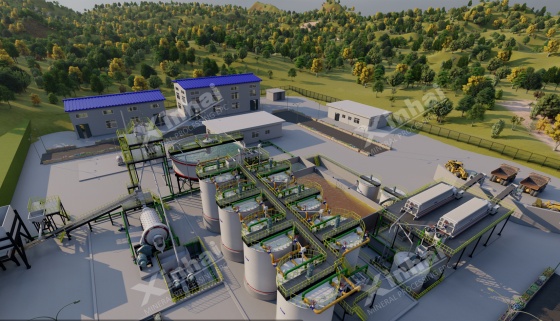If you want to know more information (such as product/process price, etc.), please contact us 24-hour telephone
Cyanidation has been the dominant gold extraction method for over a century, with modern cyanidation plants achieving recovery rates of 90-98%. This article examines the step-by-step gold processing in cyanidation plants and presents real-world case studies demonstrating their effectiveness.
1. Ore Preparation
Crushing & Grinding: Reduces ore to 75-150 microns to liberate gold particles
Pre-Treatment: Refractory ores may require roasting or bio-oxidation
2. Leaching
Cyanide Solution (0.02-0.05% NaCN) dissolves gold:
4Au + 8NaCN + O₂ + 2H₂O → 4Na[Au(CN)₂] + 4NaOH
pH maintained at 10.5-11.0 with lime to prevent HCN gas formation
Retention time: 24-72 hours in agitated tanks
3. Gold Recovery
Carbon Adsorption (CIP/CIL): Activated carbon captures gold-cyanide complexes
Zinc Precipitation (Merrill-Crowe): For high-grade solutions (>5 ppm Au)
4. Elution & Electrowinning
Loaded carbon treated with hot NaOH/NaCN solution
Gold electrowon onto steel wool cathodes
5. Smelting
Doré bars (typically 80-90% Au) produced at 1,100°C
6. Tailings Treatment
Cyanide destruction (SO₂/air or H₂O₂)
Modern plants achieve <0.2 ppm WAD cyanide in discharge

1. Muruntau Mine, Uzbekistan (World's Largest)
Process: CIL with 8-stage leaching
Scale: Processes 60 million tonnes ore/year
Recovery: 91% from 2.6 g/t ore
Innovation: Automated pH control system reduces cyanide consumption by 15%
2. Ahafo North Project, Newmont (Ghana)
Ore Type: Sulfide-refractory
Solution: BIOX® pretreatment + CIL
Results:
Recovery increased from 40% to 92.5%
Cyanide consumption lowered to 0.35 kg/t
3. Pogo Mine, Alaska (High-Efficiency Model)
Feature: Compact CIP plant in Arctic conditions
Performance:
96.2% recovery from 14 g/t ore
Zero-discharge water recycling system
Economic Impact: $0.48/tonne processing cost
Modern cyanidation plants incorporate:
Real-time cyanide monitoring (e.g., Mintek's Cyanisense)
Glycine-assisted leaching (reduces cyanide use by 30-50%)
Modular plant designs for remote locations
Environmental & Safety Considerations
While highly effective, cyanidation requires stringent controls:
ICMC Code Compliance: <50 ppm CN⁻ in tailings
Double-Lined Leach Pads: Prevent groundwater contamination
Emergency Response: HCN gas detectors with automatic shutdown
Conclusion
Cyanidation remains the gold standard (pun intended) for gold extraction, with modern plants combining high recoveries with improved environmental performance. As the case studies demonstrate:
Properly designed plants achieve >90% recovery even from complex ores
Continuous innovation is reducing cyanide consumption and environmental impact
Modular approaches make cyanidation viable for projects of all scales
For new projects, the key lies in customizing the cyanidation flow sheet to ore characteristics while incorporating the latest safety and efficiency technologies. The future of gold extraction isn't about replacing cyanidation, but about making it smarter and more sustainable.